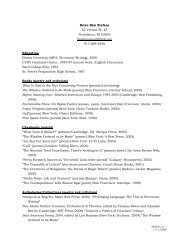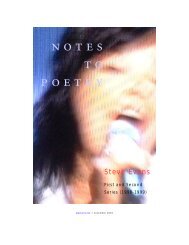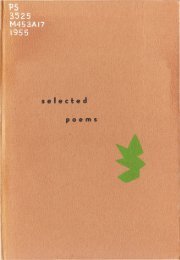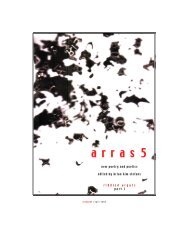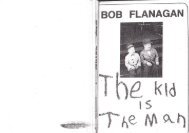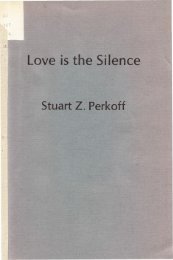new poetry and poetics edited by brian kim stefans - Arras.net
new poetry and poetics edited by brian kim stefans - Arras.net
new poetry and poetics edited by brian kim stefans - Arras.net
You also want an ePaper? Increase the reach of your titles
YUMPU automatically turns print PDFs into web optimized ePapers that Google loves.
stretches back to Berrigan, &c. (the importance, for Berrigan, of the word<br />
“amusement”).<br />
A few people criticised these poems at the time for being too “seductive”, & perhaps,<br />
today, I’d be tempted to agree—that is, altho it’s a chunk of work I still feel<br />
moderately happy with, I’m now more interested in, well, “politicized opacity”,<br />
as you put it (no doubt this is due in part to some of the “banalizing” squabbles<br />
among certain language writers of late; this still troubling opposition between the<br />
“linguistic” & the “social”; & the great rush among younger writers to “rearticulate<br />
the lyrical”), but not just a “politicized opacity”—also its potential relations<br />
to desire & desiring production, &/or to Bl a n c h o t’s notion of<br />
“c o n t e s t a t i o n”...immediacy/discharge (Ba t a i l l e’s “being without delay”) as<br />
opposed to more discursive activity... rejigging the molecules, trying to keep oneself<br />
interested in the writing as it unfolds.<br />
BKS: I didn’t realize, given the pub dates on the books, that Compositional<br />
Bonbons Placate was the earlier work, though I suspected it given the wider range<br />
of modes of poetic address, <strong>and</strong> the fact that even the longest poems in the book<br />
were shorter than the _Sore Models_ sequence. Anyway, I’m struck <strong>by</strong> the comprehensiveness<br />
of the project, the book’s total engagement with (<strong>and</strong> this is a crib<br />
from Deleuze <strong>and</strong> Guattari) “language [when it] is no longer defined <strong>by</strong> what it<br />
says... but <strong>by</strong> what causes it to move, to flow, <strong>and</strong> to explode—desire.” I don’t<br />
think, however, that you are giving free reign to a “non-referentiality,” like in<br />
early Coolidge <strong>and</strong> Andrews, with an exclusive focus on the weights that words<br />
can possess in asyntactic (or counter-syntactic) vacuums —a sort of preparatory<br />
stage, for each poet, for their later phrase-oriented work —but that you seem to<br />
have mastered this space of the “non-referential” to gain a sort of bird’s eye view<br />
of a rather large swath of poetic possibilities, both those “in use” <strong>by</strong> others, <strong>and</strong><br />
those that are yet to be discovered, but which you don’t care to exploit, since your<br />
project seems not so much to formulate <strong>new</strong> paradigms for a quasi-transparent<br />
<strong>poetics</strong> (even ones, like in Stevens <strong>and</strong> Palmer, employing great deals of “play”),<br />
but to create <strong>and</strong> destroy systems, questioning the very ability or tenability of<br />
such systems to exist in a hyper-ki<strong>net</strong>ic flux of language.<br />
This is a long sentence, <strong>and</strong> sounds vague, but I’ll quickly illustrate. “Shopword<br />
Notions” strikes me as the “And Ut Pictora Poesis Est Was Her Name” (Ashbery’s<br />
brief plea for a different reading stategy in Houeboat Days) of the book, in that<br />
it surrenders some meanings that offer a way of commenting on a way of readning<br />
the text:<br />
“...Squishy cubes of bickering quanta abut<br />
this vegetarian sense of aboutness.




